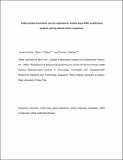Codon-biased translation can be regulated by wobble-base tRNA modification systems during cellular stress responses
Author(s)
Endres, Lauren; Dedon, Peter C.; Begley, Thomas J.
DownloadText + Figures (1.258Mb)
OPEN_ACCESS_POLICY
Open Access Policy
Creative Commons Attribution-Noncommercial-Share Alike
Terms of use
Metadata
Show full item recordAbstract
tRNA (tRNA) is a key molecule used for protein synthesis, with multiple points of stress-induced regulation that can include transcription, transcript processing, localization and ribonucleoside base modification. Enzyme-catalyzed modification of tRNA occurs at a number of base and sugar positions and has the potential to influence specific anticodon-codon interactions and regulate translation. Notably, altered tRNA modification has been linked to mitochondrial diseases and cancer progression. In this review, specific to Eukaryotic systems, we discuss how recent systems-level analyses using a bioanalytical platform have revealed that there is extensive reprogramming of tRNA modifications in response to cellular stress and during cell cycle progression. Combined with genome-wide codon bias analytics and gene expression studies, a model emerges in which stress-induced reprogramming of tRNA drives the translational regulation of critical response proteins whose transcripts display a distinct codon bias. Termed Modification Tunable Transcripts (MoTTs), we define them as (1) transcripts that use specific degenerate codons and codon biases to encode critical stress response proteins, and (2) transcripts whose translation is influenced by changes in wobble base tRNA modification. In this review we note that the MoTTs translational model is also applicable to the process of stop-codon recoding for selenocysteine incorporation, as stop-codon recoding involves a selective codon bias and modified tRNA to decode selenocysteine during the translation of a key subset of oxidative stress response proteins. Further, we discuss how in addition to RNA modification analytics, the comprehensive characterization of translational regulation of specific transcripts requires a variety of tools, including high coverage codon-reporters, ribosome profiling and linked genomic and proteomic approaches. Together these tools will yield important new insights into the role of translational elongation in cell stress response.
Date issued
2015-04Department
Massachusetts Institute of Technology. Center for Environmental Health Sciences; Massachusetts Institute of Technology. Department of Biological EngineeringJournal
RNA Biology
Publisher
Landes Bioscience
Citation
Endres, Lauren, Peter C Dedon, and Thomas J Begley. “Codon-Biased Translation Can Be Regulated by Wobble-Base tRNA Modification Systems During Cellular Stress Responses.” RNA Biology 12, no. 6 (April 11, 2015): 603–614.
Version: Author's final manuscript
ISSN
1547-6286
1555-8584